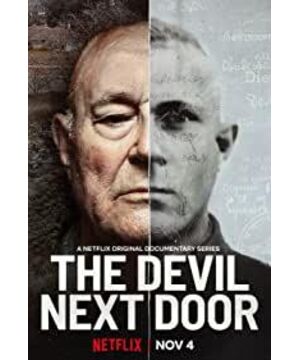When a case was passed by four governments (the Soviet Union, the United States, Israel, and Germany), it was the most tragic period in history. After a lapse of more than 40 years, trying to find the truth from the broken old paper with many loopholes has turned to the more vivid and more distorted testimonies of victims than a repeated black and white photo. Standing in the dock, a former Nazi SS, now an aging retired auto worker. The trial he will accept, 28,000 lives, also seems to be the judgment of the ancients by the people of today, the judgment of the ignorant of those who have experienced it, and even the judgment of history itself.
I think the most heart-wrenching part of this documentary. More than just how heinous the crimes of the Nazis were. Rather, when victims speak loudly and unmistakably about the most tragic black hole in their lives that sucked away their life and destroyed their memories, their own memories made a merciless joke. The tragic death of his wife and children is an unforgettable hatred in his life. But what is the son's name? When the old man was speechless. The most important things seem to fall apart in an instant.
The theory of retribution, the theory of intimidation, the theory of correction, and so on, are the basis for the establishment of punishment. In this case, the perpetrator remained anonymous for decades with no signs of committing a crime. His family loved him and even insisted that he could be the sinner full of evil. For an old man who is almost incapacitated, the meaning of punishment to him has long been negligible. Revenge, to make up for the victim, seems to have become the most important reason.
But when the victim's testimony is over time, the stressful mourning becomes less credible.
He may have committed a crime, but he is probably not the one accused. And the punishment is because of the heavy crime, only the irreversible hanging. And this revenge is also blurred to the point that it is no longer the revenge of a specific individual against a specific individual, but more like the revenge of one group against another group.
how to choose? This seems to be no longer a legal dilemma. into a moral dilemma. In this moral dilemma, everyone made their own choices. The judge said he was only focused on the sentencing and had no idea how the people around him would react. It seems like a metaphor. When you are involved in history, your position determines your point of view. You can't control it, and it's best not to care about the whole picture and the truth.
You may be emotionally blind, or you may just be lying. A false declaration wrapped in a true position seems innocuous, and it can also be said to be a kind of best effort. After all, doing things you don't like to do is called hard work, and opening your eyes and saying bull shit is also a kind of hard work.
The Munich prosecutor's answer to whether the survivor's testimony is credible, "In Germany, we have black and white, but in this Jewish state, you have to trust your survivors."
What does this mean?
John's immediate boss, a working-class car factory worker, tells the most straightforward truth in the film. The scientist who NASA put a man on the moon was also a "good Nazi". They are part of the American Dream. Americans don't care. Ironically, the U.S. officials who presided over the reopening of the investigation into John proudly emphasized that when they successfully escorted John to Germany, they used the first words sent back by the astronauts on the moon. The words are still in my ears.
Does the truth really matter to people that much? In particular, the truth is not a conclusive sentence, but is often long and obscure, full of repetitions, as if redundant, and ultimately unsatisfactory.
John's grandson said, when we stand at the moment in history, everyone will make the same choice. I think this is probably the age-old problem for all readers of history, especially the question focuses on the moral level of the bottom line of conscience, and I am afraid it has nothing to do with the self-confidence of the respondents in their own conscience. I don't think I'll ever forget the shock of watching "The Reader," Kate Winslet's female Nazi transformed into an ordinary train conductor after the war. Devil next door. Is a silent and lawful mortal his true soul, or is he a demon who kills for pleasure? Standing at this moment, I don’t know how to understand it, I have no experience, and I sincerely hope not to experience it.
Regardless of the judiciary or the public opinion, they have devoted themselves time and time again, and at the moment of victory, they have fallen into disappointment. Where is the real murderer? The real murderer is drowned in the crowd, and the crowd is surging. A person with a conscience suffers from the torment of swinging at both ends of the scale. Victims, can never heal the hurt. Righteous indignation, a cavity of righteous indignation seems to be empty. As for the defense lawyers, one was threatened and even fell to his death, and the other was directly splashed with sulfuric acid. The long judicial process is only to deal with an old man who is nearly disabled. In the end, because of the death of the old man, even the judicial conclusion in black and white was finally invalid. This seems to be the reality.
I can't help but think of Ma Boyong's "Da Ming under the Microscope". All the monstrous noises, all parties stand on their own, or only the stand is the only reality, and the truth becomes insignificant. As a result, justice gradually became blurred, and the trial process was an endless tug-of-war, as if you were bargaining for a dollar and me in the vegetable market. Are there really winners in the process? It seems that everyone pays the price. But the TV broadcast, a judicial show that was widely concerned by the whole society, was like a release and a carnival. It's hard for you to even say whether all of this is meaningful or not. It's just like everyday things, lively and lively, even if it's eating shit, everyone gets a piece of the pie, and it is blown into a delicacy with professionalism and enthusiasm. Life goes on. But this case was spectacle enough and condensed enough to make it even more shocking, and it felt even more helpless when the carriages and horses dissipated. It's like the helplessness that can't be overcome by the way of all things.
PS. What is the BGM of the section where the Berlin Wall fell? very familiar. A single song in the brain loops all night
View more about The Devil Next Door reviews









